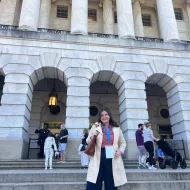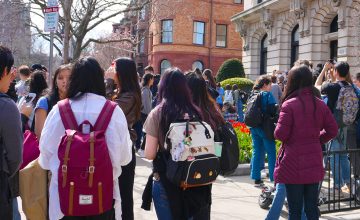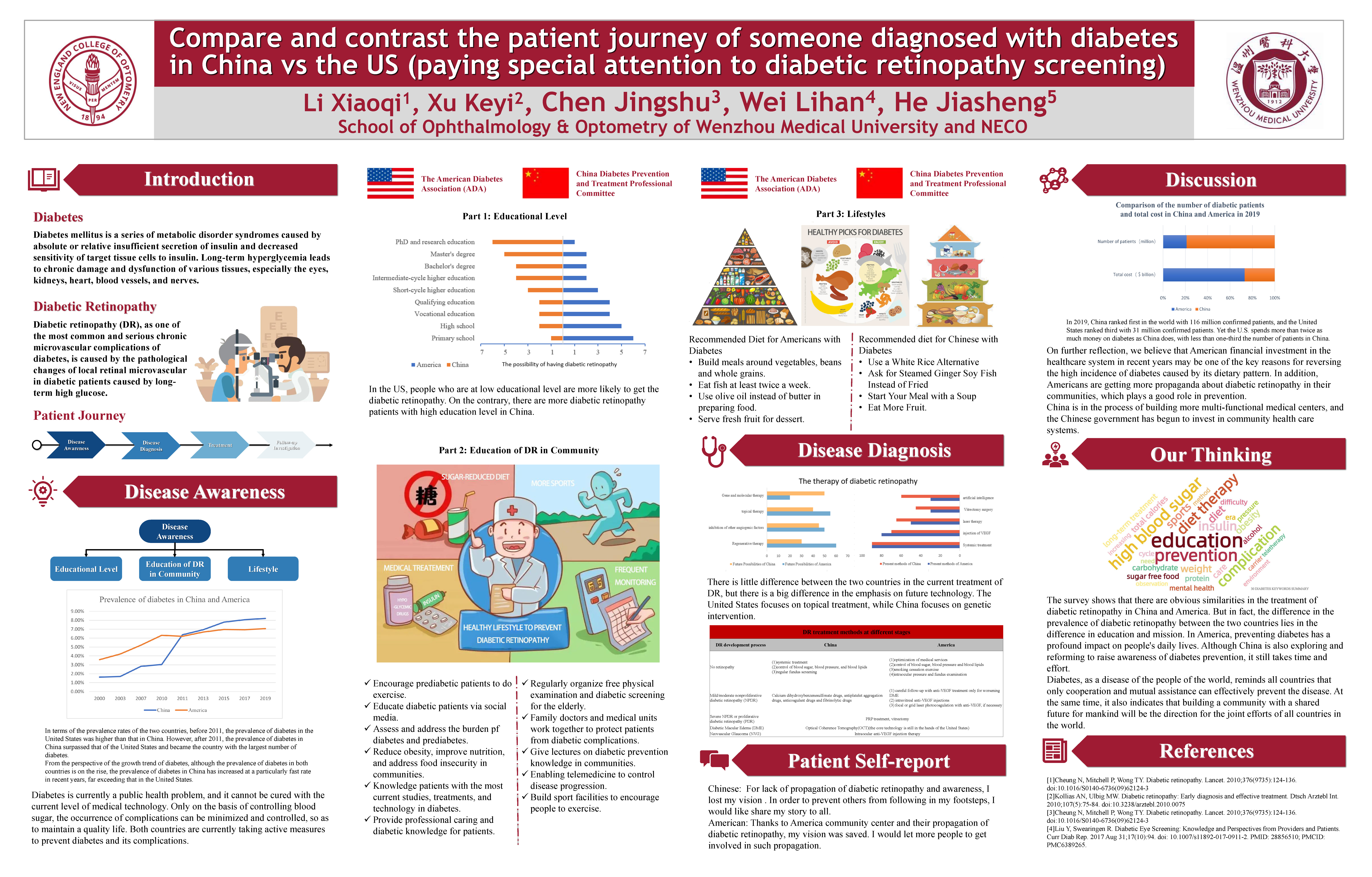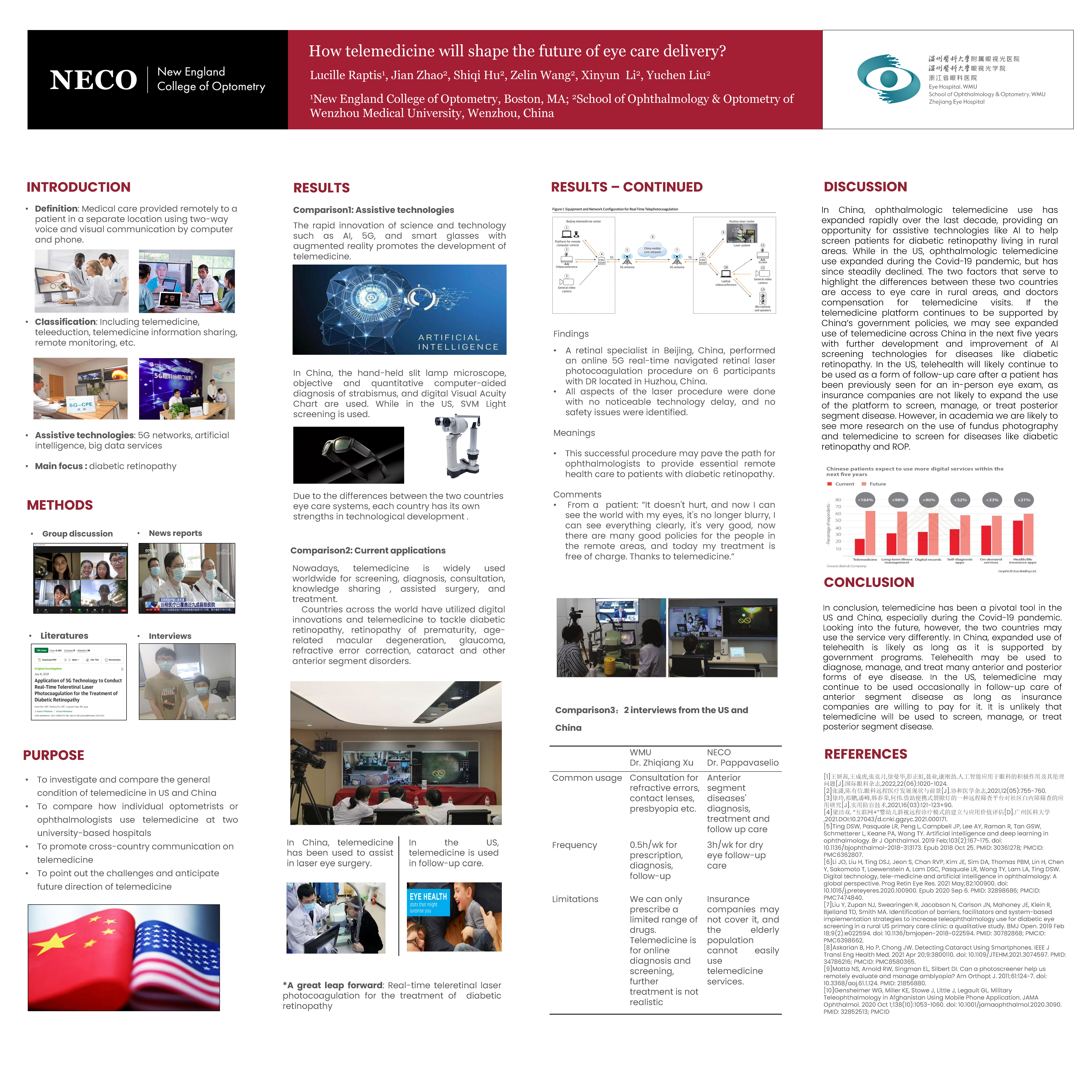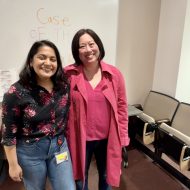
Connecting Eye and Health Care Around the World
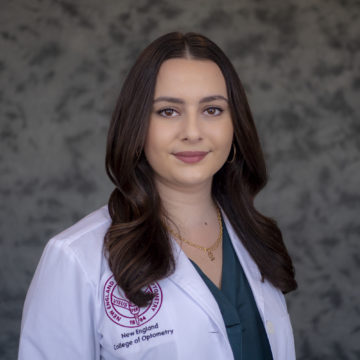
Connecting Eye and Health Care Around the World
For the past several years, NECO students have partnered with peers from Wenzhou Medical University (WMU) and SUNY Optometry to participate in the Global Health Leadership Development Program.
The program was designed to help students broaden their perspective on global health care, while providing useful skills for leadership development. One of the deliverables is a research poster on a public health issue presented to their peers and faculty. Their poster is then posted at NECO on World Sight Day.
This program was created in part because of NECO’s partnerships with many international optometry schools, one of our closest partners being WMU, and through the coordination of NECO’s Assistant Professor of Clinical Optometry and Coordinator for International Programs Dr. Meng Meng Xu, and Dr. Bina Patel, Professor of Biomedical Sciences and Disease, and the Director of International Programs.
Our relationship goes back 30 years when both schools worked together to pioneer optometry education in China. In years past they have sent ten medical students to NECO to learn about the health care system in the US and gain a more global perspective on contemporary public health issues.
Due to the pandemic, the program went online. In order to provide WMU students a more engaging experience, we partnered their final project with public health students at NECO. They did all their research and discussions virtually. They chose from a number of topics to focus on, including comparing the health journey of someone diagnosed with diabetes in the US vs China, and how technology will shape the future of general health care or eye care delivery in China and the US.
One of the NECO students who participated in this project was Lucy Raptis OD3. She shares her experiences and what she learned in the interview below. She focused on how technology will shape eye care in the future with her group partners Jian Zhao, Shiqi Hu, Zelin Wang, Xinyun Li, and Yuchen Liu.
Yi Ye from WMU also shares their experience and key takeaways from participating in the Global Health Leadership Development Program below.
NECO: How was your experience working with students from another country?
LR: I had a great time working with students from another country! I feel like I made new friends and great pen pals. We all had so much in common and really enjoyed connecting and working together. We all have very busy student schedules, plus a 12-hour time difference, so we quickly realized that we needed to meet very early in the morning or very late at night in order to effectively communicate. Once we mapped out those meeting times, it was smooth sailing and so much fun.
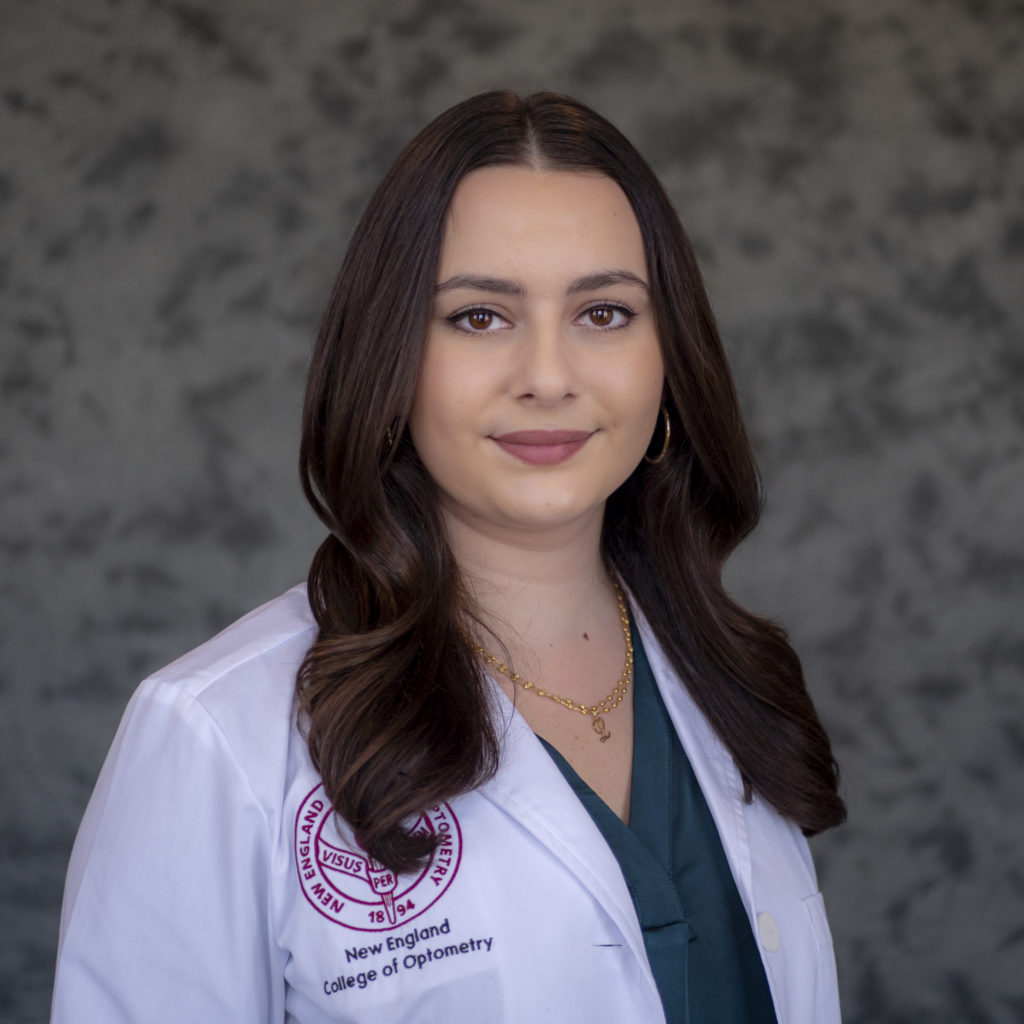
Lucy at her White Coat Ceremony
NECO: What did this international collaboration teach you?
LR: It taught me that the needs of one country can be far different than the needs of another. Sometimes it is easy to forget how structurally different medical care can be in other parts of the world. I have lived in the US my whole life, so hearing my international classmates’ perspective on healthcare in China was really eye opening. Conversely, I was also reminded how similar people tend to be. My peers and I have a lot in common, especially as students in a medical program. They were so easy to talk to and I consider them all friends of mine.
NECO: What did you learn after comparing our eye care system with China’s system?
LR: The biggest lesson I learned is that our needs are met differently than theirs. Here in the US, people in rural areas do have access to eye care. While in China, those in rural areas do not have the same access. Thus, there is a strong need for screening tools and the use of telemedicine to connect rural patients to doctors in urban areas.
I also learned that in China, the government subsidizes telehealth programs so that rural patients have better access to eye care. Recently, an eye doctor in Beijing even performed ocular laser surgery remotely. These were all fascinating things to learn about eye care in China. In the US, we use telemedicine differently, for instance it is occasionally used in eye care for follow-up appointments.
NECO: Why did you select this topic?
LR: I selected the technology topic because I knew I would learn something interesting. Technology is constantly evolving. It has had a large impact on eye care, especially over the past few decades. Comparing how technology is used in eye care in two different countries turned out to be pretty surprising.
NECO: Have you seen telehealth impact the lives of patients?
LR: Yes, I’ve seen telehealth positively impact many patients’ lives. It gives them convenient access to health care, as it takes time and money to attend in-person appointments. I have seen firsthand many patients who were so happy and relieved to not have to take time off of work, and they could instead hop on a quick 15-minute telemedicine call to chat with their doctor about their dry eye symptoms. This is why telemedicine is so great for follow-up care.
NECO: What do you hope to see for optometry in terms of delivery of care?
LR: I hope the field of optometry continues to provide fantastic care to patients in the most efficient way possible. This means using telemedicine whenever it is a reasonable option for follow-up appointments. In my experience, telemedicine appointments are efficient and convenient for both the doctor and the patient. I hope telemedicine will continue to be used daily in optometric care.
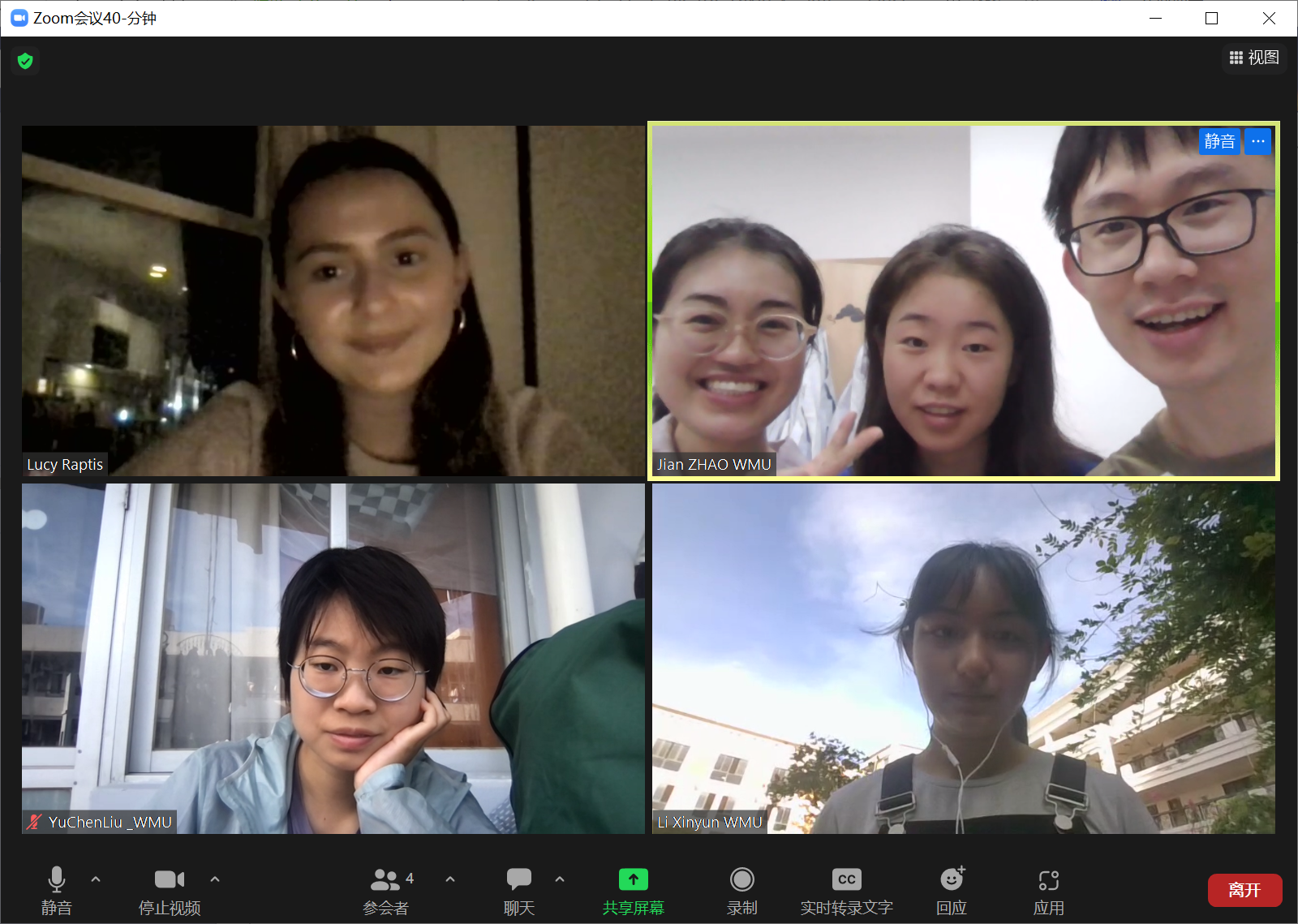
NECO student Lucy Raptis (top left) meets with WMU students over zoom.
Yi Ye from WMU also shares her experience of working with students from around the globe. Her time researching and collaborating with NECO students also uncovered new insights into health care and the needs of different countries.
NECO: How was your experience working with NECO students?
YY: It was quite interesting to work together across the ocean and time zones. When having meetings, we were usually about to go to sleep while the other had just woken up, so none of us were ever one hundred percent awake. We would leave messages for each other to work on in our free time, just like a relay race. But we ended up with a great project and both learned a lot. Also, learning things about American culture from the perspective of American students has really broadened my horizon.
NECO: What did you learn about the American healthcare system?
YY: I learned so much through this cross-cultural communication. For example, I learned that the prevention and control of myopia is not emphasized in the US, it is a very important initiative here in China, I thought it would be the same abroad.
What’s more, we shared and learned from one another’s work habits and study habits. The friendships we formed are even more than precious and impressive. All in all, it was a fun experience and hopefully one day we can work together offline!
NECO: What did you learn about eye care?
YY: I was stunned and touched by Professor Blair Wong’s story and his presentation, and it made me curious about low vision care. The various technologies for low vision care are impressive, and the US social support system for people with low vision is more complete compared to that in China.
In addition, I was impressed by the related research that focuses on the diagnosis of neurodegenerative diseases through just eye examination. That implies eye examinations are not only important for eye services, but all healthcare services. As a clinical student, these two weeks of classes have expanded my knowledge of optometry and even made me consider choosing it as an area of study in my masters degree.
More Student Stories

